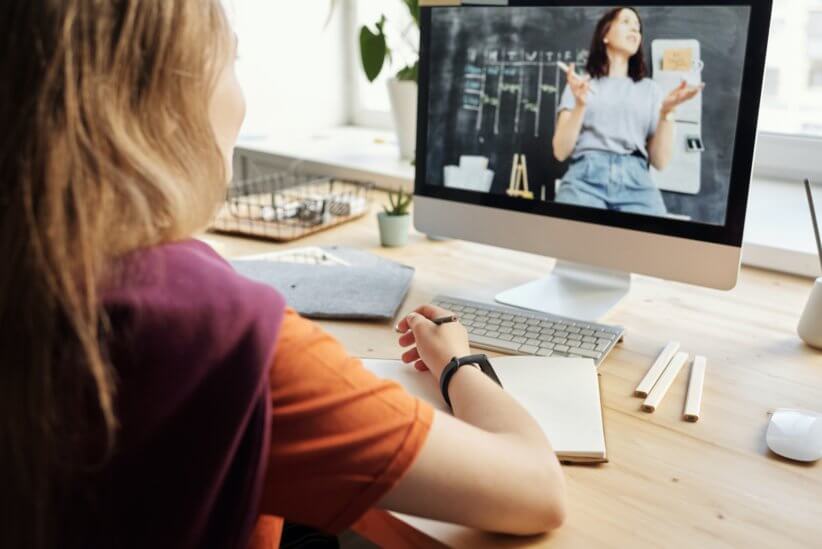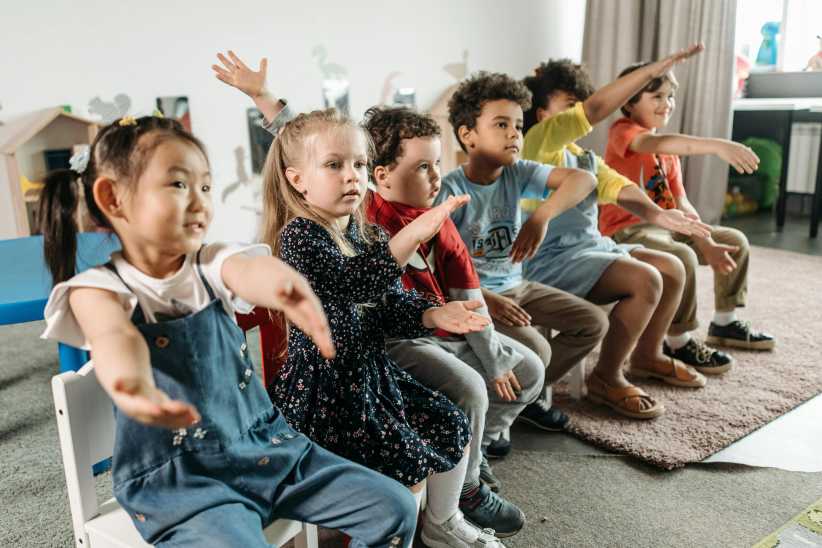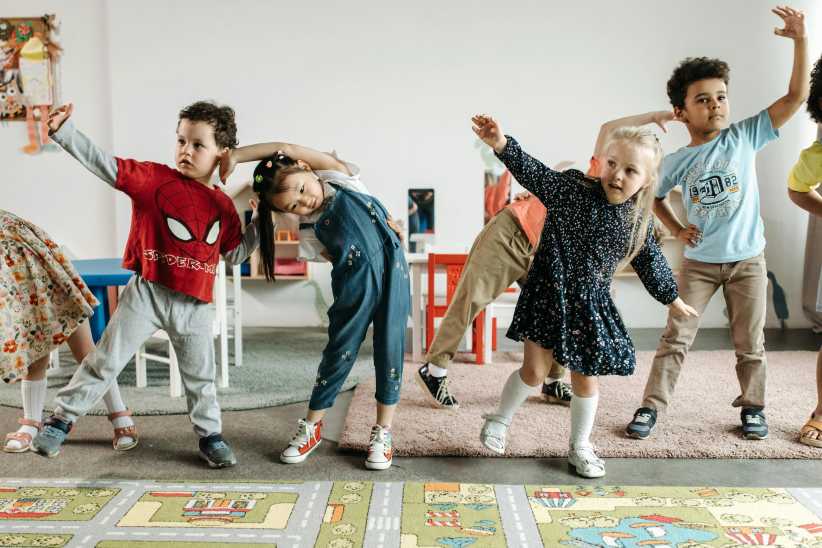Helpful Tools and Tips on How We Can Best Manage Kids’ Screen Time: Interview with Dr. Cori Cross, pediatrician, spokesperson for the AAP, and member of the AAP Council on Communications and Media executive committee
With many, if not all, kids having part or full time remote learning, parents want to know some helpful tools and tips on how we can limit and best manage kids’ screen time. We spoke to Dr. Cross, pediatrician, spokesperson for the AAP, and member of the AAP Council on Communications and Media (and also a mom!), for her insights and expertise on this important and timely topic.
Psst…Check out How to Create a Homeschool Nook for Remote Learning
Be Proactive About Screen Time
When inside for extended periods, knowing what kids are doing is important. Talk about tech ahead of time and let them know the things they can do when parents are working. Make a list of what is appropriate (maybe one episode of a certain TV show or how long they can play Roblox and then tell them to do some reading or creating) so they know what their options are and make good decisions. Leave them a list and mix it up. Dr. Cross said, “Talk it through and let them know what you anticipate and what is acceptable and you have a much better chance that they make the choices you hope they will make and then leave them some flexibility of what you ask them to do so they not just have a list but have autonomy.”
Parents Need to Check In and Make Sure Kids Know They Are Important
Parents need to be realistic that a kid can entertain themselves for a couple of hours but they also need a check-in. Parents should schedule breaks to have a snack, check in, and chit chat throughout the day so kids know when they will be together. Dr. Cross advised, “At a check-in you can address concerns for the rest of the day and set a timeframe so they know when you can stop and chat. Let kids know that they are important enough that you will take a break for them. It is very important. Jobs are very important but make sure the kids feel that they are important, too, and just saying it goes a long way.”
Foster Togetherness and Get Plenty of Rest
When done with school work, it’s really important for parents to have children in common areas of the home. We don’t want our kids to feel isolated or alone in their apartment in one room when they can’t really go out. It’s important they get out of the “work” room and have interaction with other people in the home. Make sure kids connect so they don’t get depressed.
Dr. Cross reminded us that parents need to know that kids need to get enough sleep. When kids are constantly on screens their sleep may not be great sleep. Turn off the screen early. Plan to read and shower and have downtime before bed so there is no screen time right before bedtime. If well rested, then kids are usually better behaved.
Teach Kids to Give and Take
For kids having trouble with online learning, Dr. Cross urged that “parents should quickly reach out to the teacher early. Maybe print some of the work out so it’s not all online. Other kids may need more of a break in between so there might be some activities they skip online to focus on others. There should be a give and take for them.” Without a teacher present, children don’t know how to prioritize and can get stuck, so parents need to teach kids in the beginning that if you get to this and can’t do this, move on and do the rest. Let them know they can circle what they don’t know and go back to it with a teacher or parent later, but they should keep going. That is a skill many kids don’t developmentally have in elementary and middle school yet. With younger kids, give them a written list with times next to it so they can cross it out and accomplish it and know what they have to look forward to. They like the schedules so they can look and see where they are at and try to emulate that school schedule in the home. And add reading to your list every day. Dr. Cross emphasized, “Even spending 10 minutes a day reading with your child will make a big difference in how their literacy develops over the next year.”
Model How to Unplug
Kids need to think that they are the priority. Definitely during dinner parents shouldn’t take the phone to the table. Dr. Cross recommends, “If you can disconnect for an hour, put your phone in a drawer so you don’t hear beeping. Those little moments where you put it away and look at them and talk, they need that. If they are having a hard time with a teacher or friend or learning, they won’t divulge that if we are constantly on our phone. If we want to know our kids are emotionally okay during this time, we need to give them the chance to talk to us.” Schedule your children’s digital detoxes like an hour before bed, dinnertime, and/or after school from 2:30-4 pm. Allow no tech after school and make that a house rule and kids will find something else to do. Leave out books, puzzles, games, cards, LEGOs, art & crafts so kids can figure it out on their own. You need to have a little time of boredom so kids can find something to do and figure out what they really like. Remember, this is what childhood used to be like so kids can figure it out.
AAP Screen Time Limits and Recommendations
Dr. Cross reminds us that, “Throwing away the rules is ok if it is a short period and you’re getting back to it, but with some schools doing remote learning the whole next year we worry it is a habit that will be hard to walk back later. It’s really important for parents to figure out where their comfort is.” It’s okay to tell kids that when we aren’t working and schooling on Saturday and Sunday, we stick to the traditional rules. Dr. Cross reminds us to understand that eventually COVID will be over and as soon as we can get back outside, we will want to. It won’t be as bad as we all think but making sure parents are parenting and kids realize they are allowed to still parent so we don’t lose authority and have the hierarchy thrown all out of whack.”
When Remote Learning, Try Not to Make Downtime Screen-Based Play. Get outside!
For kids who are remote learning, sedentary, and on a screen, when they have their downtime we should try not to make it screen-based play. A pre-planned FaceTime with friends is ok but there has to be some sort of check-in and time limit and understanding that this isn’t the best use of their time and they need to be physically active. Dr. Cross’s biggest recommendation to parents would be “as much as we are trying to limit our children’s contact with large groups of other children, at some point we have to let kids get back to play (assuming the family is not high risk) and play outside and play physically since the health concerns of emotionally and physically of not allowing children appropriate time to play is significant and we want to address this as a parent and society. It’s not normal for kids to be inside looking at a screen all day. This will affect their mental and physical health.” For kids in communities when they can go outside even if they can’t hang with a bunch of kids, they can still be physically active, so allow your kid to go on a bike ride or scooter ride with another child. With these activities, you keep your six feet and allow them to do things outside where they can be social and active is our best bet. When they can’t maintain their 6 feet of distance, the recommendation is that they should wear a mask. In a lot of communities where numbers are low enough, you can get kids together to socially interact and get the physical activity that they need.
It Takes A Village
Parents must talk to who their children are playing with and make sure you are comfortable and it is similar to in your approach to the new normal. There must be a real honesty there and if someone develops symptoms, let each other know and do not continue to go out and play, if you could be exposed. If you and our child are low risk, allow them to go outside and play. Parents can also feel isolated and should reach out to other parent friends and see what others are doing. Dr. Cross advised, “If they have groups they are close to and can talk it through it gives you more oomph to say I talked to your friends’ parents and they are not ok with this either.” We have our village and need it now more than ever.
Additional resources
Recommendations concerning children and media/digital devices:
aap.org
For parents, AAP’s website HealthyChildren.org offers this family media planning tool that can be helpful:
healthychildren.org
Outschool (teachers who are used to teaching on Zoom and cover things that are different from what kids usually learn) and Art Hub both are good resources for families for fun classes to round out electives or extracurriculars:
About Dr. Cori Cross
Cori Cross is a board certified pediatrician and has been serving the LA community since her residency at Children’s Hospital Los Angeles (CHLA) in 2004. She has been an active member of California Chapter2 (CA-2) for over 10 years, both as Treasurer and a Member-at-Large. In addition, she is an AAP spokesperson and uses these platforms to advocate for children and educate the public on pediatric and public health issues. In addition to print interviews on behalf of the AAP, she is a repeat medical expert on CNN’s Headline News and Los Angles’ CBS news, a regular guest on RadioMD’s Healthy Children and Sirus XM’s Doctor Radio.
Early in her career, it was evident that screens would have a profoundly different effect on this next generation. She joined the AAP’s Council on Communications and Media and has since served two terms on the Executive Committee. She was a lead author on the AAP’s “Media Use in School-Aged Children and Adolescents” as well as the accompanying technical report “Children and Adolescents and Digital Media.” She has continued working and educating in this space, giving talks locally and nationally to parents, student, educators and pediatricians on the relationship between screens and children which is constantly changing and the impact this has on children and their health. She has partnered with Common Sense Media locally to give panel discussions and nationally to develop resources for pediatricians to address these issues in their offices. In 2017, she won an Outstanding Achievement in Innovation Award from the AAP for her work in creating the Family Media Use Plan toolkit on HealthyChildren.org. She is currently working with the AAP to update both HealthyChilren.org resources and the AAP’s children and media policy statement.
In 2017, she was also awarded the Associated Administrators of Los Angeles (AALA) Community Volunteer Award for her near decade work in partnering with the nurses at LAUSD to address and curtail childhood obesity. During this time, she met with local leaders, participated in multiple Walk to School programs and spoke at many public schools about nutrition and healthy lifestyle choices.
This effort culminated in the Fit to Play and Learn Obesity Prevention Curriculum that she and Dr. Tracey Zaslow co-created and which went on to be used in many LAUSD schools as a way to teach students and their parents about healthy lifestyle choices. It was for this program and her ongoing dedication to this cause that she received the AALA in 2017.
Dr. Cross graduated cum laude from Barnard College with a BA in philosophy. She attended The University of Medicine and Dentistry of New Jersey, where she obtained her M.D. and was elected to the AOA honor society. She then moved to L.A. with her husband where she did her pediatric residency at CHLA. She currently lives in the Pacific Palisades with her husband and three children.
























